Bereavement, Grief and Loss
What is grief?
Grief is what we feel when somebody we are close to dies. For many of us, bereavement or loss may be the most distressing experience we will ever face. How we react will be influenced by many different things; age and personality, our cultural background and religious beliefs or even the nature of the death.
Everyone experiences grief differently and there is no 'normal' or 'right' way to grieve. There are some feelings and reactions which people commonly experience after a death. This information sheet is about helping you make sense of your own reactions to loss, what you can do to help yourself and where you can go for more advice and support:
Reactions in grief
Shock and denial: “This can’t be/is not happening…”
It may take you a long time to grasp what has happened. The shock can make you numb, and some people at first carry on as if nothing has changed. You may feel disorientated, as if you have lost your place and purpose in life or are living in a different world. It is hard to believe that someone important is not coming back. Denial is a survival mechanism which helps us to pace our feelings of grief by letting in only as much as we can handle.
Pain: “This is unbearable” Feelings of pain and distress (both physical and emotional) following bereavement can be overwhelming and frightening. You may feel as if you are on an emotional roller coaster and at times find it difficult to do even everyday tasks. You may notice changes in appetite and sleep, exhaustion and restlessness, anxiety and irritability. The most overwhelming feeling can be, simply, the sense of loss and the struggle to adjust to that loss.
Anger: “This isn’t fair! Why is this happening?” Anger is a completely natural emotion in response to loss. Death and loss can seem cruel and unfair, especially when you feel someone has died before their time or when you had plans for the future together. We may also feel angry towards the person who has died, or angry at ourselves for things we did or didn’t do or say to the person before their death.
Guilt: “If only I had / hadn’t done…” Guilt is another common reaction. People who have been bereaved often say they feel directly or indirectly responsible for their loved one’s death. You may also feel guilty if you had a difficult or confusing relationship with the person who has died, or if you feel you didn’t do enough to help them when they were alive.
Bargaining: “I will do anything to make this go away…” Bargaining often accompanies guilt. We may think about ways to bring our loved one back. Some people may promise their God or the universe that they will live a better life if only they can have their loved one restored to them.
Depression: “What’s the point? Nothing matters anymore…” Depression is often associated with loss and many bereaved people experience feelings of depression following the death of someone close.
Longing: Thinking you are hearing or seeing someone who has died is a common experience and can happen when you least expect it. You may find that you can't stop thinking about the events leading up to the death. "Seeing" the person who has died and hearing their voice can happen because the brain is trying to process the death and acknowledge the finality of it.
Other people's reactions: One of the hardest things to face when we are bereaved is the way other people react to us. They often do not know what to say or how to respond to our loss. Because they don't know what to say or are worried about saying the wrong thing, people can avoid those who have lost someone. This is hard for us because we may well want to talk about the person who has died. It can become especially hard as time goes on and other people's memories of the deceased begin to fade.
Moving Through Loss
So how do we cope with the loss of a loved one? How can we continue to live our lives in the face of a life-changing event? It’s important to be aware that:
- Grief is not a task to be completed
- Grief is not a ‘problem’, a ‘disease’ or a ‘weakness’
- There is no ‘normal’ timetable for grieving
- Grief is not something to ‘get over’ or ‘work through’ until you get ‘closure’
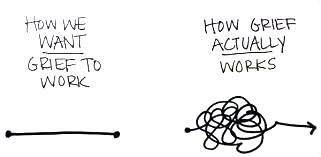
- Grief is a normal human experience to be supported, witnessed and held
- Grief is an ongoing process with many ups and downs
- Grief is about coping with change and learning to live with loss
- Grief is an experience that, in time, we can grow around
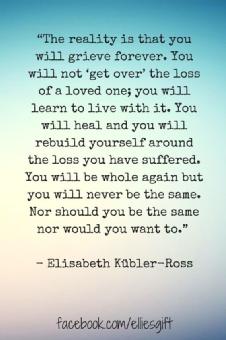 |
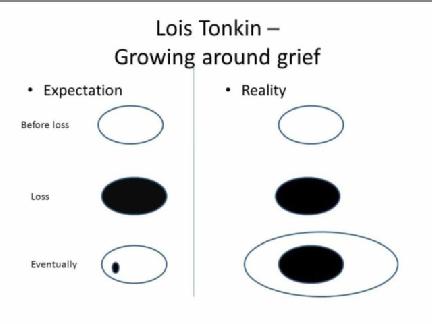 |
What can help?
It is important that you take care of yourself following a bereavement. One of the most helpful things you can do is talk about the person who has died and your relationship with them. Who you talk to will depend on you. It may be your family, friends, a faith/spiritual adviser, your GP, a counsellor or a support organisation.
Do…..
Give yourself permission to grieve. You may feel anything from shock to guilt to sorrow to anger to despair and hopelessness. In some situations, you may also feel relief – for example, when someone has died peacefully after a long period of extreme suffering.
- Notice your feelings and make room for them to be here, because they already are.
- Express your feelings – talking, writing or drawing can be therapeutic.
- Accept your feelings – this doesn’t mean you are “all right” or “OK” with what has happened. Rather, it refers to acknowledging the reality of the loss.
Acknowledge that at times you will be overwhelmed. Grief can hit you like a tidal wave; feelings can rise up, bowl you over and carry you away. Knowing that at times you may feel overwhelmed and observing this may let you ‘see’ that the waves may knock you around but they cannot harm you.
Learn to anchor yourself. Over time, the waves start to reduce in size. They’re still big, but they’re no longer tidal waves. Sometimes they’ll knock you over. Sometimes they won’t.
To anchor yourself when these waves hit, you can practice a very broad focus mindfulness exercise - see https://warwick.ac.uk/services/wss/topics/relaxation/
Develop self-compassion. Be kind to yourself. If someone you loved was suffering, what caring things would you say and do for them? Try talking to yourself and caring for yourself in this way.
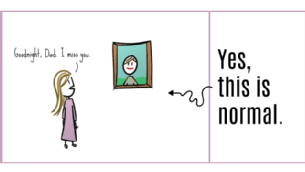
Continue a bond with your loved one. It is normal and okay to maintain a sense of connection to the loved one you have lost. Grief rituals can be helpful. Holding onto special items, daily habits, private rituals, lighting a candle, prayers, looking at photos, talking to your loved one (it doesn’t mean you’re crazy!), visiting places where you feel close to them, adopting a hobby they enjoyed – these are all ways to continue a bond with your loved one.
Practice the 3 R’s
- RELAX - grief is exhausting, you may need to rest more often, go at a slower pace, take the pressure of yourself, allow yourself to pause and stop.
- REJUVENATE – replenish your energy, create routines, eat healthily, exercise your body, set small goals, schedule small pleasures, spend time in nature
- RECLAIM – connect to yourself, what is important and meaningful to you? How can you move towards those things a little bit every day?
When you’re ready…
Consider how you can grow from this experience. What might you learn about forgiveness, compassion, letting go, acceptance? How might your own experience benefit others that you care about? Do you notice your heart opening towards others?
Appreciate what you still have. While acknowledging what you have lost, also make room to notice what you still have. When we let go of what ‘could’ and ‘should’ have been then we can connect with what is still here to nourish us. Joy and pain can coexist alongside each other. As Kahlil Gibrahn wrote in The Prophet, “The deeper that sorrow carves into your being, the more joy you can contain.”
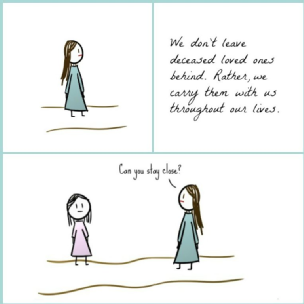
Don’t….
- Isolate yourself
- Keep your emotions bottled up
- Think you are weak for needing help
- Feel guilty if you are struggling to cope
- Turn to drugs or alcohol – the relief will only be temporary
Occasionally we can get ‘stuck’ in grief and need some support to learn to live with the loss, perhaps with the help of a counsellor. Medical support and information can be obtained from your GP.
Useful resources
|
|
|
|
National charity providing support and information. |
|
|
Cruse's website for young people. |
|
|
Support for survivors of bereavement by suicide - including regular group meetings in Leamington and Coventry |
|
|
A resource for people bereaved through suicide or other unexplained death, and for those helping them. |
|
|
Help for coping with bereavement. |
|
|
Leaflet from the Royal College of Psychiatrists. |
|
|
|
Leaflet on bereavement. |
|
Comic story on death of family member by suicide. |
|
|
Helpful pages if you are trying to support someone who has been bereaved |
|
|
|
|
|
Available from the University Library: |
|
|
|
|
|
|
|
|
|
|
|
|
|
|
|
|
|
Explores process of grief and how to treat it. |
|
|
|
|
|
|
|
|
Personal stories about suicide and an exploration of what can help those affected by it. |
